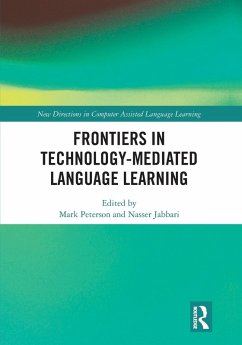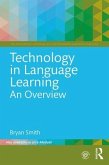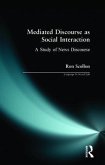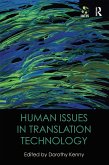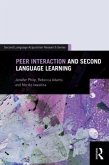Frontiers in Technology-Mediated Language Learning
Herausgeber: Peterson, Mark; Jabbari, Nasser
Frontiers in Technology-Mediated Language Learning
Herausgeber: Peterson, Mark; Jabbari, Nasser
- Broschiertes Buch
- Merkliste
- Auf die Merkliste
- Bewerten Bewerten
- Teilen
- Produkt teilen
- Produkterinnerung
- Produkterinnerung
This edited volume is designed to showcase a selection of recent cutting-edge innovations. This publication incorporates chapters dealing with the use virtual reality, social networking, speech technologies and social semiotics.
Andere Kunden interessierten sich auch für
![Technology in Language Learning Technology in Language Learning]() Bryan SmithTechnology in Language Learning51,99 €
Bryan SmithTechnology in Language Learning51,99 €![Technology-Enhanced Teaching and Learning of Chinese as a Foreign Language Technology-Enhanced Teaching and Learning of Chinese as a Foreign Language]() Amber NavarreTechnology-Enhanced Teaching and Learning of Chinese as a Foreign Language49,99 €
Amber NavarreTechnology-Enhanced Teaching and Learning of Chinese as a Foreign Language49,99 €![Mediated Discourse as Social Interaction Mediated Discourse as Social Interaction]() Ron ScollonMediated Discourse as Social Interaction66,99 €
Ron ScollonMediated Discourse as Social Interaction66,99 €![Human Issues in Translation Technology Human Issues in Translation Technology]() Human Issues in Translation Technology55,99 €
Human Issues in Translation Technology55,99 €![Mediated Discourse Mediated Discourse]() Ron ScollonMediated Discourse71,99 €
Ron ScollonMediated Discourse71,99 €![The God Archetype and the Development of Faster than Light Technology The God Archetype and the Development of Faster than Light Technology]() Christopher Alan ByrneThe God Archetype and the Development of Faster than Light Technology82,99 €
Christopher Alan ByrneThe God Archetype and the Development of Faster than Light Technology82,99 €![Peer Interaction and Second Language Learning Peer Interaction and Second Language Learning]() Jenefer PhilpPeer Interaction and Second Language Learning72,99 €
Jenefer PhilpPeer Interaction and Second Language Learning72,99 €-
-
-
This edited volume is designed to showcase a selection of recent cutting-edge innovations. This publication incorporates chapters dealing with the use virtual reality, social networking, speech technologies and social semiotics.
Produktdetails
- Produktdetails
- Verlag: Routledge
- Seitenzahl: 156
- Erscheinungstermin: 6. Mai 2025
- Englisch
- Abmessung: 254mm x 178mm x 9mm
- Gewicht: 308g
- ISBN-13: 9781032497273
- ISBN-10: 1032497270
- Artikelnr.: 73729730
- Herstellerkennzeichnung
- Libri GmbH
- Europaallee 1
- 36244 Bad Hersfeld
- gpsr@libri.de
- Verlag: Routledge
- Seitenzahl: 156
- Erscheinungstermin: 6. Mai 2025
- Englisch
- Abmessung: 254mm x 178mm x 9mm
- Gewicht: 308g
- ISBN-13: 9781032497273
- ISBN-10: 1032497270
- Artikelnr.: 73729730
- Herstellerkennzeichnung
- Libri GmbH
- Europaallee 1
- 36244 Bad Hersfeld
- gpsr@libri.de
Mark Peterson is Associate Professor of Foreign Language Studies at Kyoto University. He has published widely in the field of computer assisted language learning. He is the author of Computer Games and Language Learning (Palgrave) and editor of Digital Games and Language Learning: Theory, Development and Implementation (Bloomsbury). Dr Peterson established and now directs a research lab (https://petersonlab.weebly.com) dedicated to investigating the effective use of digital technologies in foreign language learning. Nasser Jabbari is a Lecturer in Applied Linguistics and Language Teaching at the University of Essex (UK) Department of Language and Linguistics. He received a PhD (in curriculum and instruction, English as a second language [ESL]) from Texas A&M University (USA). His research interests include 'naturalistic' and 'tutorial' computer assisted language learning (CALL), specifically, language use and learning in social media and online gaming environments. His current research focuses on the psycholinguistic and sociocultural processes underlying second language acquisition (SLA) and second language (L2) socialization in multilingual and multicultural contexts of massively multiplayer online (role-playing) games.
1 Contemporary computer assisted language learning: A view from the
frontiers of research 2 Genre-based L2 research writing: SLA-CALL
interfaces for prototyping an interactive virtual reality environment 3
Effects of English-speaking lessons in virtual reality on EFL learners'
confidence and anxiety 4 Automatic speech recognition as a source of
corrective feedback on L2 pronunciation 5 Fostering cross-cultural
communication and awareness through social Networking technologies: A case
study of virtual exchange 6 From digital tools to digital others: A social
semiotic technologies approach for studying learner interactions with
screen-based resources 7 AR-enhanced second and foreign language
instruction and practice: A systematic review of instructional designs,
theoretical underpinnings, and research focus 8 A Systematic Literature
Review of Automatic Speech Recognition in L2 Learning: A Case for L2
Writing
frontiers of research 2 Genre-based L2 research writing: SLA-CALL
interfaces for prototyping an interactive virtual reality environment 3
Effects of English-speaking lessons in virtual reality on EFL learners'
confidence and anxiety 4 Automatic speech recognition as a source of
corrective feedback on L2 pronunciation 5 Fostering cross-cultural
communication and awareness through social Networking technologies: A case
study of virtual exchange 6 From digital tools to digital others: A social
semiotic technologies approach for studying learner interactions with
screen-based resources 7 AR-enhanced second and foreign language
instruction and practice: A systematic review of instructional designs,
theoretical underpinnings, and research focus 8 A Systematic Literature
Review of Automatic Speech Recognition in L2 Learning: A Case for L2
Writing
1 Contemporary computer assisted language learning: A view from the
frontiers of research 2 Genre-based L2 research writing: SLA-CALL
interfaces for prototyping an interactive virtual reality environment 3
Effects of English-speaking lessons in virtual reality on EFL learners'
confidence and anxiety 4 Automatic speech recognition as a source of
corrective feedback on L2 pronunciation 5 Fostering cross-cultural
communication and awareness through social Networking technologies: A case
study of virtual exchange 6 From digital tools to digital others: A social
semiotic technologies approach for studying learner interactions with
screen-based resources 7 AR-enhanced second and foreign language
instruction and practice: A systematic review of instructional designs,
theoretical underpinnings, and research focus 8 A Systematic Literature
Review of Automatic Speech Recognition in L2 Learning: A Case for L2
Writing
frontiers of research 2 Genre-based L2 research writing: SLA-CALL
interfaces for prototyping an interactive virtual reality environment 3
Effects of English-speaking lessons in virtual reality on EFL learners'
confidence and anxiety 4 Automatic speech recognition as a source of
corrective feedback on L2 pronunciation 5 Fostering cross-cultural
communication and awareness through social Networking technologies: A case
study of virtual exchange 6 From digital tools to digital others: A social
semiotic technologies approach for studying learner interactions with
screen-based resources 7 AR-enhanced second and foreign language
instruction and practice: A systematic review of instructional designs,
theoretical underpinnings, and research focus 8 A Systematic Literature
Review of Automatic Speech Recognition in L2 Learning: A Case for L2
Writing

